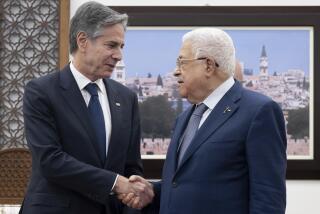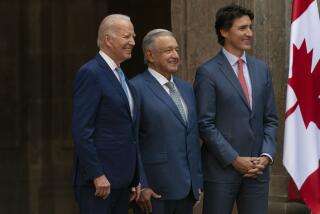Neighbor States Meet on Strategy for New Regime
- Share via
UNITED NATIONS — As opposition forces advanced across Afghanistan, Secretary of State Colin L. Powell met with the foreign ministers of the country’s neighbor states Monday to devise a strategy for the construction of a post-Taliban government.
Powell and U.N. officials said they did not expect Kabul, the Afghan capital, to remain in Taliban hands much longer, according to diplomats here, and urged the swift creation of a transitional regime. Hours after Powell and the ministers convened, the city fell to the opposition Northern Alliance.
“Because of the developments on the ground, we are going to try, as soon as possible, to get a hopefully representative sample of the Afghan population together and see what kind of interim arrangement we can work together for Kabul,” Lakhdar Brahimi, the United Nations special envoy to Afghanistan, said after the meeting.
Powell, noting that Taliban resistance had been collapsing across Afghanistan over the previous 48 hours, said an emergency peacekeeping force may be needed soon to ensure a calm transition to a new regime, participants at the session said.
Brahimi told reporters later that he expected Afghan opposition factions to convene for coalition talks “very, very soon”--perhaps as early as this week. There have been tentative preparations for a gathering in Geneva or in Istanbul, Turkey, perhaps with the participation of the octogenarian former king, Mohammad Zaher Shah, who now lives outside Rome, as well as Afghan activists based in Pakistan, Cyprus and Iran.
“We have always insisted that this process should be home-grown,” he said.
There were no Afghans at Monday’s closed-door strategy meeting, however, even though the pre-Taliban Afghan regime maintains a recognized diplomatic mission at the United Nations.
The diplomats meeting here represented the so-called “six-plus-two” group of nations--those bordering Afghanistan, plus Russia and the United States.
The group offers a valuable forum for U.S. coordination with Iran, with which Washington does not have direct diplomatic relations. Iran on Monday initially urged further consultations before the formation of any new U.N.-endorsed interim regime, diplomats said.
But Iran joined the other seven countries, which also include Pakistan, China, Turkmenistan, Uzbekistan and Tajikistan, in unanimously endorsing the establishment of a new “multiethnic, politically balanced, freely chosen Afghan administration” composed of groups “both within Afghanistan and from among the Afghan diaspora.”
Powell did not speak publicly before or after the meeting, and the assembled ministers divulged no details about the expected leadership of an interim regime. But it was clear that the Bush administration has managed to forge broad support among U.N. leaders for the decision it made almost two months ago that the Taliban regime should be overthrown.
Immediately following the session, Powell attended an open meeting of the Security Council, which after an hour of debate unanimously approved an American-backed resolution calling on U.N. member states “to intensify their efforts to eliminate the scourge of international terrorism.” The resolution urged countries with limited police and regulatory resources to seek U.N. technical help in the pursuit of terrorist political and financial networks.
Kofi Annan, the U.N. secretary-general, opened the Security Council session with a strong defense of the U.S. contention that deliberate violence against civilians must be repudiated and criminalized, regardless of the cause it ostensibly serves.
“There must be moral clarity here,” Annan said. “Like war, terrorism is an immensely complicated phenomenon, with multiple objectives and causes, a multitude of weapons and agents, and virtually limitless manifestations. The only common denominator is the calculated use of deadly violence against civilians for political purposes.”
Together, Monday’s two sessions offered a striking example of how the Bush administration succeeded in keeping the General Assembly session focused on the U.S. government’s new overriding concerns: the global fight against terrorism, and the dislodging of the Taliban regime from Afghanistan.
The meetings also provided further evidence that the administration is using U.N. forums as pivotal instruments for achieving its foreign policy goals, even as many U.N. members voice criticism of the U.S. military campaign in Afghanistan.
The U.S. counter-terrorism agenda was viscerally reinforced by Monday morning’s crash of an American Airlines jet after takeoff from John F. Kennedy International Airport. Some here feared initially that could have been a deliberate attack, with the U.N. itself a possible target.
Security alerts temporarily shut the United Nations’ doors, interrupted diplomatic conferences and kept dignitaries waiting for hours behind barricades outside. Diplomats stopped in the corridors to watch television monitors that had been switched from a closed-circuit General Assembly broadcast to CNN’s live coverage of the crash.
But the buildings were not evacuated, and scheduled meetings were allowed to proceed.
As one indication of the importance Washington attached to the “six-plus-two” meeting, Powell was accompanied to the session by virtually the entire top-level U.S. foreign policy team for Afghanistan.
The United States and its allies don’t have a lot of time, warned Annan. There is a growing concern that hopes for a new Afghan coalition could founder as the Northern Alliance asserts control over territory abandoned by fleeing Taliban forces.
The ministers “assessed the fast-evolving situation” and resolved to accelerate efforts to “form a broad-based Afghan government,” Annan said.
The foreign ministers spent much of the hourlong session listening to a report from Brahimi, now in his second tour as the U.N. envoy to Afghanistan, who returned to New York over the weekend after extensive consultations with the leadership of the major Afghan exile factions.
Though he indicated a few days ago that he no longer believed that Taliban loyalists should be invited into any new coalition, Brahimi appeared to have amended this view. After saying that the Afghans themselves must decide who participates in any new regime, he was asked directly if that included the Taliban.
“That includes everybody that is willing to participate in this process,” Brahimi said.
More to Read
Sign up for Essential California
The most important California stories and recommendations in your inbox every morning.
You may occasionally receive promotional content from the Los Angeles Times.













